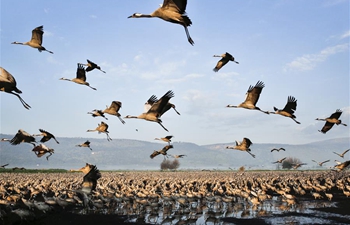WASHINGTON, Feb. 23 (Xinhua) -- A housewarming party inside the giant panda house at Smithsonian's National Zoo here on Saturday brought joy and cheer to visitors, fueling a fresh round of "panda fever" in the U.S. capital.
Genevieve Gwiazda and her son, Zach, were watching Bei Bei, a three-year-old male giant panda, chomping on bamboo and tumbling in the grass, as they were waiting for the start of the party celebrating the completion of the giant panda house's new visitor exhibit.
Zach, from Baltimore, state of Maryland, told Xinhua that he has become a giant panda lover since he first visited the zoo and saw giant pandas with his family years ago.
"I just love seeing the pandas," said the fifth-grader, who watches them almost everyday through the zoo's panda cam. "I like their black-and-white color on them."
The exhibit Zach and his mother were about to visit, whose update began late last year, aims to help people learn more about giant pandas, offering information about the ecology, history, reproduction, conservation and care of these unique bears, with interactive games and activities, according to the zoo.
New photos and videos also give visitors a behind-the-scenes glimpse of life at the zoo's giant panda habitat.
"We are excited to see it all," Zach's mother said.
Steven Monfort, the zoo's director, welcomed hundreds of visitors to the giant panda house and the new exhibit.
"So much has changed for giant pandas, for the better, in the past decade," Monfort said. "This updated exhibit is really inspiring because it shows how much of a difference we can make with science and cooperation."
Minister Xu Xueyuan of the Chinese Embassy in the United States, which co-hosted the event with the zoo, said the scale of the housewarming shows how much China's giant pandas are adored in the United States.
Dubbed China's "national treasure," giant pandas mainly live in southwest China's Sichuan Province as well as neighboring Shaanxi and Gansu.
"They are also charming, tolerant, and peace-loving, representing many values of China itself, and are loved by people all over the world," Xu said.
Besides Bei Bei, at the zoo's David M. Rubenstein Family Giant Panda Habitat also live his parents, Mei Xiang and Tian Tian. As part of Saturday's event, all of them, as well as red pandas there, received a frozen treat, made of diluted apple juice, grape juice, leaf-eater biscuit puree, bamboo stalks and a variety of fruits and vegetables.
Mei Xiang, a female, and Tian Tian, a male, arrived in Washington D.C. in late 2000 as the zoo's second pair of giant pandas. Ever since then, the pair has given birth to three cubs.
Bei Bei is now the only panda offspring in the zoo after his elder brother, Tai Shan, and his elder sister, Bao Bao, moved to China, respectively in 2010 and early 2017, as per an agreement between China and the United States.
All the giant pandas at the U.S. national zoo are "doing very well" and "very healthy," Nicole McCorkle, a giant panda keeper, told Xinhua.
Bei Bei, who's almost as large as his mother and weighs 106 kilograms, is "growing extremely well," she added. "He's always been a kind of a big baby, a little bit ahead on the growth curve."
The zoo, part of the world-renowned museum and research complex Smithsonian Institution, received its first pair of giant pandas, Ling Ling and Hsing Hsing, in 1972, which were given by the Chinese government as a gift to commemorate the groundbreaking progress made with the U.S. side in terms of their ties that year.
Since then, the presence of giant pandas, whom Monfort called "true rock stars," has drawn countless fans from around the world to the zoo. According to spokesperson Devin Murphy, almost 80 percent of people who come to the zoo visit giant pandas.
"They are extremely popular," she said.
The facility was given "an unparalleled opportunity to study giant panda behavior, health and reproduction," which has contributed greatly to its conservation.
The United States has been cooperating decades-long with the Chinese side in conservation of the giant panda, an epitome of symbolized cross-cultural collaboration between the two countries and also another theme of Saturday's celebration.
"Together with our Chinese partners, we have been collaborating on creating new knowledge about the giant panda biology, ecology, working together to help save giant pandas from extinction," Monfort said. "We're very proud of the history of our partnership."
Partly thanks to that, the endangered status of giant pandas has been furthered eased.
The latest census in 2014 found there were 1,864 giant pandas alive in the wild, up from 1,114 decades ago. The number of pandas bred in captivity reached 548 globally as of last November, according to China's National Forestry and Grassland Administration.
Giant pandas, which "have become the most popular envoys of friendship, bringing laughter and joy to millions of Americans," are "not only beneficiaries of the China-U.S. relationship, but also the best symbols of the win-win exchanges and cooperation between the two sides," Xu added.













